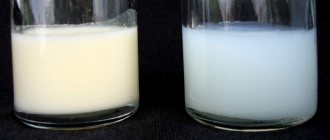Judging by village life, there are no other drinks besides milk and curdled milk, especially for a nursing woman - all vitamins and a completely natural composition. But today's standards of feeding and raising children indicate the opposite. Is it possible to drink milk while breastfeeding is already being considered in each specific case separately, because some people prefer to go on a milk diet to increase lactation, while others are afraid of a high concentration of milk protein and do not drink a healthy drink at all.
Whether or not to drink milk while breastfeeding is a controversial issue, which is considered separately in each specific case.
What are the benefits of drinking milk?
There is no clear answer to introducing milk into a nursing mother’s diet, but when discussing the advisability of taking such a product, we must not forget about its beneficial properties for the body:
- When breastfeeding, a large amount of calcium contained in it is considered important for women's health. After all, during pregnancy, a woman’s body is greatly depleted - hair, skin, nails do not look in the best light, and subsequent lactation only aggravates the situation. A valuable drink will help cope with the situation and replenish the necessary reserves;
- in addition to calcium, it contains enough other microelements and vitamins, for example, phosphorus, magnesium;
- Milk protein, which is necessary for the development of a baby, is well absorbed by the body (although this point is quite controversial; recently, cases of food intolerance have become increasingly common);
- Low fat milk is known for its absorbent properties. By removing excess toxins from the body, it cleanses the body, lowers the level of acidity, which is especially important when fighting heartburn;
- known to have a calming effect - a little warm drink is best for relaxing and calming before bed.
Product benefits
Milk has a large number of beneficial properties that have a beneficial effect on the body's systems. This product contains valuable compounds in the form of:
- Magnesium, which takes an active part in metabolic processes.
- Lysine, which helps normalize liver and pulmonary functionality, the production of new blood cells, and also prevents the development of muscular dystrophy and anemia.
- Methionine, which helps break down fats. This substance also helps prevent the occurrence of liver dystrophy.
- Large amounts of phosphorus and calcium necessary to strengthen nail plates, hair, teeth, and also to improve the functioning of the nervous system.
- Tryptophan, which helps produce nicotinic acid and serotonin, prevents the development of diabetes, tuberculosis, and cancer.
Milk benefits the child and his mother due to the fact that it contains a large amount of fatty acids (about 20 types), proteins, vitamins A, K, D, E, and milk sugar. Systematic use of the drink helps reduce the acidity of gastric juice, normalize blood pressure, and remove toxic compounds from the body. In addition, the benefit of the product is to eliminate insomnia, thanks to its calming effect on the central nervous system.
Why should you not use gw in the first month?
Despite all its advantages, especially in the first month after the baby’s birth, milk can negatively affect the newborn’s digestion and also lead to allergies. In the first few months, the child’s body is actively changing, growing, the digestive system is still forming, and milk in this case is still a very difficult product to digest. Therefore, it is recommended for a nursing mother to drink milk drinks no earlier than the third month. First, a woman should try to introduce fermented milk products into her diet; only after a correct, positive reaction should she try introducing milk. At the same time, doctors advise drinking only boiled product until the child reaches six months of age.
A breastfeeding mother can drink milk in boiled or pasteurized form no earlier than the second month after birth.
Goat milk
Goat milk has a specific aroma and taste. For a person who has never tried this drink, it may not seem entirely pleasant. If goat's milk enters the body of a nursing mother, it can change the baby's taste, as a result of which he may refuse to breastfeed. However, this product is the most healthy milk drink; it contains the necessary components to maintain the health of a nursing mother (large amounts of protein, sodium, manganese, potassium, magnesium, iron, phosphorus, copper, vitamin A, B, C).
The introduction of this product into the diet during lactation should be careful. First, it is recommended to add a small amount of this product to tea, and then observe the child’s reaction throughout the day. In the absence of allergic manifestations (skin rashes, bloating), you can consume whole goat milk in small portions.
The positive qualities of goat milk include:
- strengthening bones and teeth, preventing the development of rickets;
- normalization of the functionality of the gastrointestinal tract;
- removal of toxic compounds from the body;
- prevention of anemia, assistance in hematopoiesis;
- strengthening the immune system;
- beneficial effects on the condition of the skin, nail plates, and hair;
- elimination of constipation and bloating;
- normalization of the nervous system, elimination of insomnia, improvement of mood.
Before introducing goat milk, you should familiarize yourself with some recommendations:
- Use no earlier than one month after birth.
- You should start introducing the drink with a small sip. If the baby does not show an allergic reaction within 24 hours, you can increase the dosage to 1 tbsp. per day (about 3 - 5 rubles per week).
- Initially, milk should be diluted with boiled water (1:1 ratio), gradually reducing the volume of regular liquid.
Young mothers who have not tried this drink before or are prone to developing food allergies should be especially careful.
We recommend reading: Coconut for breastfeeding, milk and oil from it: can it be consumed, norms and contraindications
When and how to introduce milk into a mother’s diet during breastfeeding
It’s up to the mother to decide at what month to start drinking a healthy drink, but it’s definitely not worth doing this in the first month of a newborn’s life, especially since you shouldn’t drink whole milk. After this time, recommendations for introducing a new ingredient are basically the same as for introducing all other products. First, a nursing mother should try melted or boiled drinks, observe the baby’s condition for several days, and only after the third day can she drink milk again.
Portions should also be small at first, and you can gradually increase your consumption each time. But in any case, no matter how good dairy products are for babies, there is no need to consume more than half a liter in one day.
What is dangerous for mother and baby?
Despite the fact that milk contains elements important for human development and growth, doctors remind that the product is one of the most powerful allergens. This is due to the fact that the protein entering the body is recognized by the immune system as foreign and is rejected. Mother and baby may experience negative reactions:
- peeling of the skin, rash, redness;
- indigestion (regurgitation, vomiting, loose stools or constipation, colic, bloating);
- breathing problems (cough, rhinitis, asthma).
You should also exclude the product from the diet if the baby is not gaining weight well, is restless, sleeps soundly and for a long time, or if one of the family members has a tendency to allergies.
IMPORTANT: if the above symptoms are detected after breastfeeding, the mother should immediately eliminate cow's milk from her diet and not give it to the baby.
What can be replaced
Modern cooking is quite well developed, therefore, fearing for the health of the child, mothers may not drink cow's milk, but replace it with drinks of a similar composition. In any case, the vitamins and beneficial microelements it contains can be obtained from other products. As an alternative you can consider:
- goat's milk - there is much less controversy about its use during breastfeeding, moreover, it is much better absorbed by the body, its composition is in no way inferior to cow's, and for baby food it is practically hypoallergenic. Many people don’t like it for its taste, but if you purchase the product fresh, the unpleasant taste sensations will not spoil the drink;
- plant analogues - soy, almond or rice. There are several analogues from plant components, which often have a fairly balanced composition; they can replace traditional cow's milk, especially if you are allergic to animal protein. For example, soy milk is also well absorbed by the body, and contains no less useful substances - vitamins E, C, sodium, iron, plant fiber, sucrose. But it is also recommended to drink it during breastfeeding no earlier than 4 months; the rest of the time it is good to use it for preparing various dishes with the addition of milk;
- cottage cheese, cheese, kefir - any fermented milk product. If you choose products of good quality, or even better, home-made ones, then you can get even more vitamins from them;
- nuts, bread, meat, eggs or fish will also help replenish calcium and protein.
Currently, there are a large number of plant analogues of cow's milk, which make it possible to almost completely replace it in cooking.
Breastfeeding or not?
Not all mothers can or want to breastfeed. Each of them has good reasons for this, which others need to respect. Breastfeeding often sparks heated discussions where ideological views are expressed or even debates arise on the issue. The fact is: a mother who breastfeeds is not automatically a better mother than another woman who does not breastfeed her child. And vice versa. You need to understand that every mother on her journey tries to give her baby the best way to feed.
When to start breastfeeding your baby
In order to make sure that the baby is already ripe for drinking, you need to make sure that the child does not have allergies or individual intolerance to animal protein.
You can try giving the drink no earlier than 8 months.
In this case, for the first test they give a boiled drink mixed with water. At first, one teaspoon will be enough, then they watch the baby’s reaction, if everything is fine, after a few days the portion can be increased, gradually bringing it to the maximum of 100 grams. In the future, slowly displace the water and leave only the milk. It is considered optimal to start complementary feeding with dairy products with adapted baby curds or cocktails. They will fill the child's body with necessary vitamins and normalize the microflora.
Cons of breastfeeding
So far, many benefits of breastfeeding have been listed. But don’t hide the fact that breastfeeding can also be associated with difficulties. For example, mothers are more connected to their children through breastfeeding and cannot be away for long periods of time, which is sometimes necessary. Or because they must be careful with their diet and, even more so, with alcohol. Or because the father cannot take on the responsibility of feeding the child. However - and this applies to both topics - breast milk can be expressed and bottle fed. Maybe then this will be a small consolation for women. Moreover, the period of breastfeeding is limited. And how many positive things can you give to your baby during this time.
Although breastfeeding is something completely natural and you might think that every mother intuitively knows how to breastfeed, it is still better to do really good research on this topic during pregnancy, see how to apply correctly and carefully study the whole process to avoid unpleasant surprises . Then it will be much easier to feed the baby.
Subscribe
Detki.guru on Telegram
Leave a comment
Benefits for the child
Under no circumstances should you give your baby a raw product, only boiled or pasteurized milk. The latter retains all the beneficial substances, since the processing of such a product is more gentle. If a caring grandmother wants to give her child fresh milk, then she needs to be 100% sure of its quality and how clean and correctly the milking is done.
A valuable drink for a child will only be useful at the appropriate age; for infants, adult milk is replaced by infant formula, which is already enriched with all useful substances. But if, after all, the mother accustoms the baby to the usual - from a cow or goat, using purchased varieties, then you need to purchase products with the lowest percentage of fat content.
Breastfeeding mothers can drink milk, but only after a month of feeding and first you need to make sure that the child does not suffer from allergies or stomach upset when drinking it. In this case, you should choose the right variety, and it is better to replace it with goat. However, if a woman still prefers cow's milk when breastfeeding, then she should drink it boiled.
Can I have other dairy products?
The range of fermented milk products is quite wide
In addition to pasteurized cow's milk, other dairy and fermented milk products can be breastfed. Baked milk is made from it by boiling for a long time at 90°C. The beneficial properties are retained, but due to the evaporation of water, the product becomes fattier and more concentrated in protein content. When breastfeeding, baked milk can be introduced only after 3-4 months, starting with 3-4 tbsp. l., gradually increasing the volume to 1 glass per day.
You can also try adding powdered milk to the menu. Its advantage is the additional enrichment with a vitamin-mineral complex; a weaker solution can be diluted. The daily volume is the same as for whole.
Fermented milk products for breastfeeding
A good alternative to whole cow's milk. When breastfeeding, it is advisable to introduce fermented milk products even earlier, because vitamins, calcium, phosphorus remain, beneficial bacteria are added, and the protein is denatured as a result of fermentation and becomes less allergenic.
On a note! When choosing, you need to pay attention to the fat content - no more than 3.5%. You should also not buy low-fat products; calcium from them is not absorbed.
Kefir normalizes the intestinal microflora with the help of kefir grains, which suppress putrefactive bacteria. Fresh, daily product helps regulate bowel movements. Gradually introduce into the diet after 6-7 months. Consumption rate – 1-2 tbsp. per day. You can drink it in the morning or evening with bran, nuts (if you have included them in your diet), and dried fruits instead of a full meal.
Fermented milk products (sour cream, cottage cheese, yogurt, fermented baked milk) are easier to digest and less allergenic. Cottage cheese regulates intestinal function, strengthens bones, improves immunity, normalizes the cardiovascular system and brain activity. Can be added a week after birth. Consumption rate – 150 g.
At the same time, natural yogurt is allowed to be introduced. In addition to other beneficial properties of dairy products, it eliminates pain and discomfort in the stomach. You can drink 250-500 ml per day. Sour cream is introduced 3-4 weeks after birth. The maximum daily volume is 30 g. Ryazhenka and yogurt are allowed after 2-3 months in the amount of 200-400 ml.
It's better to make your own yoghurts
When drinking milk is prohibited during breastfeeding
If an allergy or eating disorder occurs in a baby, the milk drink should be abandoned. Rashes on a child’s body can also be a manifestation of other pathologies, therefore, first of all, consultation with a pediatrician is needed.
Important!
Baked milk, due to its high fat content and calorie content, is not recommended for consumption by a nursing mother until the baby is 3-4 months old.
Allowed amount of milk during breastfeeding
The baby's first acquaintance with the new component of mother's milk should be gradual. This rule is the most important when introducing a new product. To begin with, you should drink half a glass of milk drink. Then, observe the reaction of the baby’s body for 3-4 days. If the child does not have skin redness and stomach upset, then the volume of milk can be increased. After two weeks, if the baby does not react, the product can be used without fear.
Types of milk
During breastfeeding, a woman can drink cow's or goat's milk. Nutritionists give greater preference to goat meat, since it has less calories and is not inferior to cow milk in terms of beneficial properties. Soy milk is very popular today because it:
- does not contain lactose;
- contains vegetable protein;
- allowed during the GW period;
- contains vitamins A, B12, D, E and phytoestrogens, which are involved in maintaining youthful skin and have a beneficial effect on the entire body.










